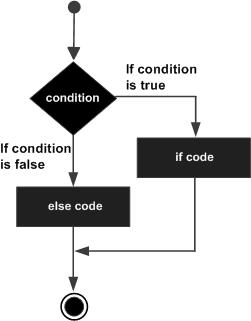Java if-else语句
在一个if语句后面可以跟一个可选的else语句,当布尔表达式为假时执行。
语法
if…else语句的语法如下:
if(Boolean_expression) {
// Executes when the Boolean expression is true
}else {
// Executes when the Boolean expression is false
}
如果布尔表达式评估结果为真,则执行 if 代码块,否则执行 else 代码块。
流程图

示例
public class Test {
public static void main(String args[]) {
int x = 30;
if( x < 20 ) {
System.out.print("This is if statement");
}else {
System.out.print("This is else statement");
}
}
}
这将产生以下结果 −
输出
This is else statement
if语句和else if语句
if语句后面可以跟着一个可选的else if语句,这样可以很方便地使用单个if…else if语句来测试各种条件。
当使用if、else if和else语句时,有几点需要记住。
- 一个if语句可以有零个或一个else语句,并且必须出现在任何else if语句之后。
-
一个if语句可以有零个或多个else if语句,并且它们必须出现在else语句之前。
-
一旦某个else if语句成功,剩下的else if语句和else语句将不会被测试。
语法
以下是if…else语句的语法 −
if(Boolean_expression 1) {
// Executes when the Boolean expression 1 is true
}else if(Boolean_expression 2) {
// Executes when the Boolean expression 2 is true
}else if(Boolean_expression 3) {
// Executes when the Boolean expression 3 is true
}else {
// Executes when the none of the above condition is true.
}
示例
public class Test {
public static void main(String args[]) {
int x = 30;
if( x == 10 ) {
System.out.print("Value of X is 10");
}else if( x == 20 ) {
System.out.print("Value of X is 20");
}else if( x == 30 ) {
System.out.print("Value of X is 30");
}else {
System.out.print("This is else statement");
}
}
}
这将产生以下结果 –
输出
Value of X is 30
 极客教程
极客教程